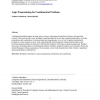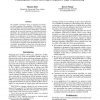1686 search results - page 73 / 338 » Programs as polygraphs: computability and complexity |
ACE
2004
14 years 11 months ago
2004
An examination of some recent programming texts indicates that the complexities of modern programming languages and environments have replaced the study of algorithms and programm...
AIR
2010
14 years 10 months ago
2010
Combinatorial problems appear in many areas in science, engineering, biomedicine, business, and operations research. This article presents a new intelligent computing approach for...
EUROPAR
2007
Springer
15 years 3 months ago
2007
Springer
Computer systems are increasingly parallel and heterogeneous, while programs are still largely written in sequential languages. The obvious suggestion that the compiler should auto...
AAAI
2006
14 years 11 months ago
2006
We establish a declarative theory of forgetting for disjunctive logic programs. The suitability of this theory is justified by a number of desirable properties. In particular, one...
CASCON
1996
14 years 11 months ago
1996
For almost a decade we have been working at developing and using template-based models for coarse-grained parallel computing. Our initial system, FrameWorks, was positively receiv...


